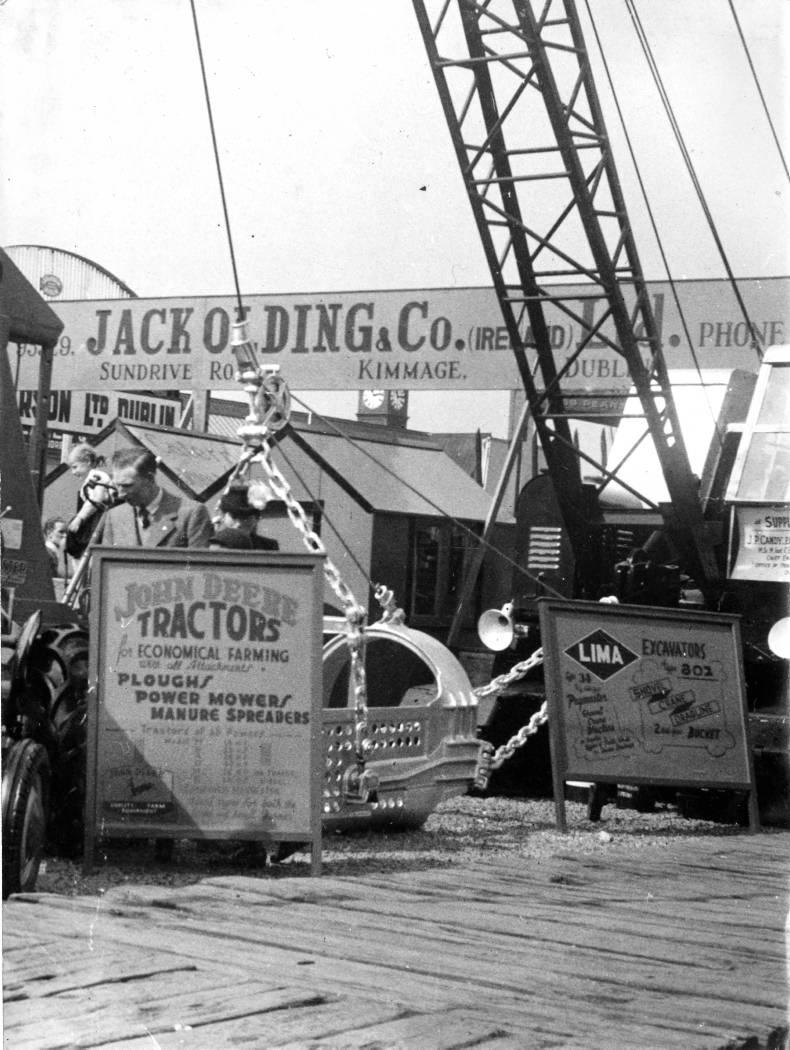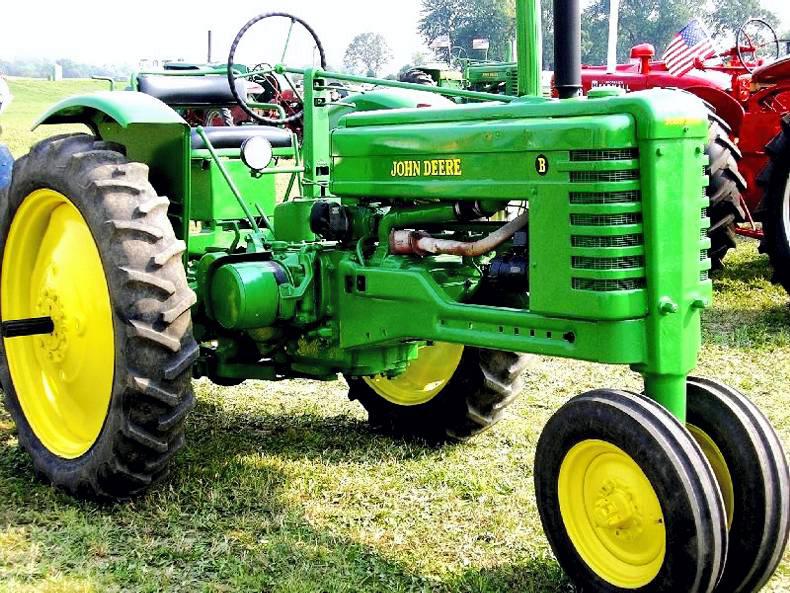John Deere tractors have had a long history in Ireland, a history that goes back earlier than the 50 years being celebrated this year. I’ve looked through more than 100 years of records and this week we cover the period from 1916 to the late 1950s, when John Deere was just emerging as a tractor brand against some stiff competition.
The first John Deere connection for Ireland came in 1916, when the Overtime tractor was advertised in the Spring Show catalogue. The tractor was a Waterloo Boy Model N that was rebranded as an Overtime tractor and was imported by London-based company JL Martin, who traded as Overtime Tractor Company of 124-127A Minories, London.
The Overtime tractor was painted in different colours to the original Waterloo Boy tractor that was sold in North America. It was grey with orange wheels, while the Waterloo Boy was green with yellow wheels. The tractors were imported into Britain in containers and assembled near London.
The 1916 Spring Show listing for the Overtime tractor claimed it delivered 24hp at the belt and 12hp at the drawbar. It was described as a light all-round power plant for drawing ordinary tillage implements as well as doing belt work on the average farm. Overtime claimed that it could pull a three- or four-furrow plough, ploughing seven acres per day and was priced at £255. It is believed that there is at least one restored model of this Overtime tractor still in existence in Ireland.
The Irish connection with the Overtime tractor is interesting in that it was also distributed in Ulster by Harry Ferguson for a period from his Belfast garage. The Overtime gave Ferguson his first real experience of tractor power in farming.
Further south, Thompsons Motor Car Company showed the tractor at the 1919 Spring Show. Thompsons were major players in the farm machinery business right up until the 1950s.
The Waterloo Boy Gasoline Tractor Company was taken over by John Deere in 1918 and the John Deere logo started to appear on the tractors. The Overtime-branded tractors continued to be available for a period after this.
Supplies of tractors to the Irish market were low as the new state was beginning to emerge. The Department of Agriculture and Technical Innovation reported that there were just 70 tractors in Ireland in 1917. This had increased to 800 by 1928. It was estimated that an average of 90 tractors per year were sold between 1917 and 1939, with the result that there were close to 2,000 tractors on Irish farms by 1939.
 The John Deere range by that time was imported into Ireland and Britain by Jack Olding & Co, which was based at Hatfield, in Hertfordshire, England.
The John Deere range by that time was imported into Ireland and Britain by Jack Olding & Co, which was based at Hatfield, in Hertfordshire, England.
That company operated from a variety of different premises in Dublin, during the period between 1937 to 1950, when it held the John Deere franchise in Ireland. Olding operated from Kimmage and later from Jamestown Road in Inchicore, Dublin.
Oldings also became sole agents for Caterpillar in England and Ireland in 1939. The company supplied many Caterpillar dozers to the World War II effort, along with John Deere tractors for farming, as much of the British manufacturing industry was focused on military work.
The John Deere tractor range in Ireland during the 1950s included the Model M, Model B (photo belox) and Model MC, all of which were powered by a two-cylinder 4in (100mm) bore vaporising oil (TVO) engine. These tractors came with a belt pulley and PTO drive, but not a three-point linkage.

The eight John Deere dealers in Ireland during the Olding period in the 1940s to mid-1950s included the following:
J Delahunt & Sons, Roscrea, Tipperary.M Hennessy & Sons, Castledermot, Kildare.PJ Hurst, Tullamore, Offaly.Joseph T Keogh, Arklow, Wicklow.JF Murphy, Kilconnell, Galway.McKenzies of Cork.Jack Olding Ltd, Dublin.James Pim & Sons, Mountmellick, Laois.By the end of the 1940s Britain was nearly bankrupt and strict controls on foreign exchange, particularly the US dollar, were introduced. This is thought to be the main reason for Jack Olding ending his Caterpillar dealership and John Deere dealership.
This may not be entirely true as Jack Olding got involved with British engineering company Vickers to develop the ill-fated Vickers Viper bulldozer with a Rolls Royce diesel engine that they believed would beat Caterpillar sales. Jack Olding later sold his business to Vickers.
Around that time Jack Olding became interested in horse racing. He is reported to have bought Dollanstown Stud, near Kilcock, Co Kildare, for £40,000 in 1955. Jack Olding died in 1958.
The John Deere business moved to the Irish Agricultural Wholesale Society in around 1958.
Next week we continue the story.13 March IVETA AGM County Arms Hotel Birr Offaly 086-867 2664
17 March Nenagh St Patrick’s Day IVETA Parade Tipperary 087-900 5163
17 March Vintage Rally in Blarney Village Cork 087-279 5814
19 March Irish Seat to Atlantic Ocean Tractor Run Dublin 01-843 7061
19 March Charity Tractor Pull, Bell’s Farm, Kilkubbin Down 0044-7767-271764
20 March Ballyglass Heritage Club Autojumble, Claremorris Mayo 086-820 0652
20 March Rathcormac Vintage Club Road Run, Rathcormac Cork 087-810 1828
20 March Camross Club Run & Ploughing, Mountrath Laois 087-979 3807
20 March Thurles Andy Horgan Memorial Road Run Tipperary
20 March Mad for Models Show, Woodford Dolmen Hotel Carlow 087-267 0737
26 March Easter Maurice Collins Vintage Tractor Run Kerry 087-751 1831
27 March Easter Sunday Maurice Collins Rally Kerry 087-751 1831
27 March Tipperary Vintage Rally, Tipperary Racecourse Tipperary 087-757 9358
10 April IVETA Jumble Swallows Quarter, Donaghmore Laois 086-867 2664
17 April Battle Of The Hills Vintage Road Run Cavan 087-632 9362
24 April South Eastern Vintage Auto Jumble, Ardattin Carlow 087-238 5195
John Deere tractors have had a long history in Ireland, a history that goes back earlier than the 50 years being celebrated this year. I’ve looked through more than 100 years of records and this week we cover the period from 1916 to the late 1950s, when John Deere was just emerging as a tractor brand against some stiff competition.
The first John Deere connection for Ireland came in 1916, when the Overtime tractor was advertised in the Spring Show catalogue. The tractor was a Waterloo Boy Model N that was rebranded as an Overtime tractor and was imported by London-based company JL Martin, who traded as Overtime Tractor Company of 124-127A Minories, London.
The Overtime tractor was painted in different colours to the original Waterloo Boy tractor that was sold in North America. It was grey with orange wheels, while the Waterloo Boy was green with yellow wheels. The tractors were imported into Britain in containers and assembled near London.
The 1916 Spring Show listing for the Overtime tractor claimed it delivered 24hp at the belt and 12hp at the drawbar. It was described as a light all-round power plant for drawing ordinary tillage implements as well as doing belt work on the average farm. Overtime claimed that it could pull a three- or four-furrow plough, ploughing seven acres per day and was priced at £255. It is believed that there is at least one restored model of this Overtime tractor still in existence in Ireland.
The Irish connection with the Overtime tractor is interesting in that it was also distributed in Ulster by Harry Ferguson for a period from his Belfast garage. The Overtime gave Ferguson his first real experience of tractor power in farming.
Further south, Thompsons Motor Car Company showed the tractor at the 1919 Spring Show. Thompsons were major players in the farm machinery business right up until the 1950s.
The Waterloo Boy Gasoline Tractor Company was taken over by John Deere in 1918 and the John Deere logo started to appear on the tractors. The Overtime-branded tractors continued to be available for a period after this.
Supplies of tractors to the Irish market were low as the new state was beginning to emerge. The Department of Agriculture and Technical Innovation reported that there were just 70 tractors in Ireland in 1917. This had increased to 800 by 1928. It was estimated that an average of 90 tractors per year were sold between 1917 and 1939, with the result that there were close to 2,000 tractors on Irish farms by 1939.
 The John Deere range by that time was imported into Ireland and Britain by Jack Olding & Co, which was based at Hatfield, in Hertfordshire, England.
The John Deere range by that time was imported into Ireland and Britain by Jack Olding & Co, which was based at Hatfield, in Hertfordshire, England.
That company operated from a variety of different premises in Dublin, during the period between 1937 to 1950, when it held the John Deere franchise in Ireland. Olding operated from Kimmage and later from Jamestown Road in Inchicore, Dublin.
Oldings also became sole agents for Caterpillar in England and Ireland in 1939. The company supplied many Caterpillar dozers to the World War II effort, along with John Deere tractors for farming, as much of the British manufacturing industry was focused on military work.
The John Deere tractor range in Ireland during the 1950s included the Model M, Model B (photo belox) and Model MC, all of which were powered by a two-cylinder 4in (100mm) bore vaporising oil (TVO) engine. These tractors came with a belt pulley and PTO drive, but not a three-point linkage.

The eight John Deere dealers in Ireland during the Olding period in the 1940s to mid-1950s included the following:
J Delahunt & Sons, Roscrea, Tipperary.M Hennessy & Sons, Castledermot, Kildare.PJ Hurst, Tullamore, Offaly.Joseph T Keogh, Arklow, Wicklow.JF Murphy, Kilconnell, Galway.McKenzies of Cork.Jack Olding Ltd, Dublin.James Pim & Sons, Mountmellick, Laois.By the end of the 1940s Britain was nearly bankrupt and strict controls on foreign exchange, particularly the US dollar, were introduced. This is thought to be the main reason for Jack Olding ending his Caterpillar dealership and John Deere dealership.
This may not be entirely true as Jack Olding got involved with British engineering company Vickers to develop the ill-fated Vickers Viper bulldozer with a Rolls Royce diesel engine that they believed would beat Caterpillar sales. Jack Olding later sold his business to Vickers.
Around that time Jack Olding became interested in horse racing. He is reported to have bought Dollanstown Stud, near Kilcock, Co Kildare, for £40,000 in 1955. Jack Olding died in 1958.
The John Deere business moved to the Irish Agricultural Wholesale Society in around 1958.
Next week we continue the story.13 March IVETA AGM County Arms Hotel Birr Offaly 086-867 2664
17 March Nenagh St Patrick’s Day IVETA Parade Tipperary 087-900 5163
17 March Vintage Rally in Blarney Village Cork 087-279 5814
19 March Irish Seat to Atlantic Ocean Tractor Run Dublin 01-843 7061
19 March Charity Tractor Pull, Bell’s Farm, Kilkubbin Down 0044-7767-271764
20 March Ballyglass Heritage Club Autojumble, Claremorris Mayo 086-820 0652
20 March Rathcormac Vintage Club Road Run, Rathcormac Cork 087-810 1828
20 March Camross Club Run & Ploughing, Mountrath Laois 087-979 3807
20 March Thurles Andy Horgan Memorial Road Run Tipperary
20 March Mad for Models Show, Woodford Dolmen Hotel Carlow 087-267 0737
26 March Easter Maurice Collins Vintage Tractor Run Kerry 087-751 1831
27 March Easter Sunday Maurice Collins Rally Kerry 087-751 1831
27 March Tipperary Vintage Rally, Tipperary Racecourse Tipperary 087-757 9358
10 April IVETA Jumble Swallows Quarter, Donaghmore Laois 086-867 2664
17 April Battle Of The Hills Vintage Road Run Cavan 087-632 9362
24 April South Eastern Vintage Auto Jumble, Ardattin Carlow 087-238 5195
 The John Deere range by that time was imported into Ireland and Britain by Jack Olding & Co, which was based at Hatfield, in Hertfordshire, England.
The John Deere range by that time was imported into Ireland and Britain by Jack Olding & Co, which was based at Hatfield, in Hertfordshire, England. 









SHARING OPTIONS